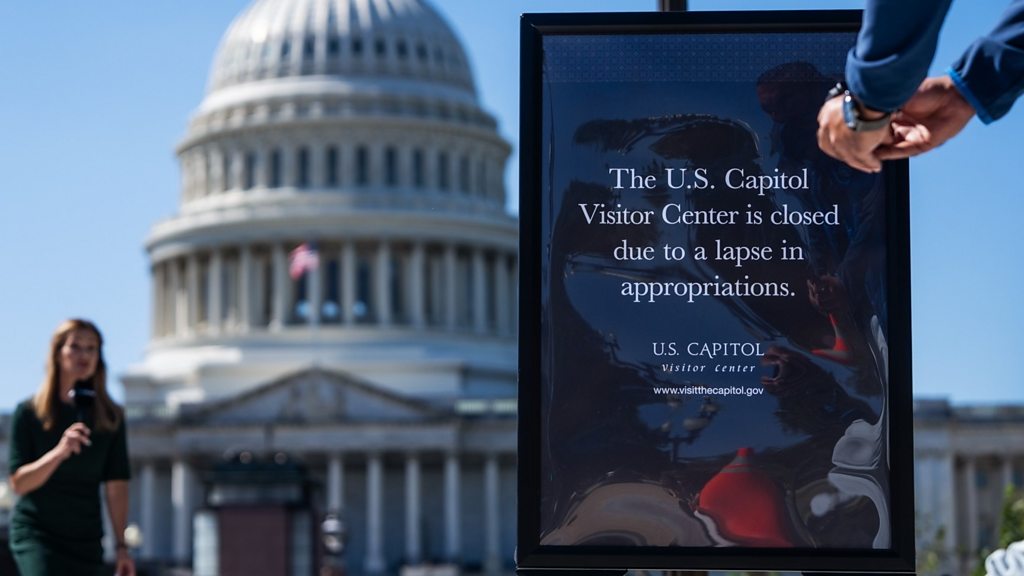

The Senate voted late Sunday evening to approve the initial phase of a proposal aimed at concluding the U.S. government shutdown, which commenced on October 1.
The procedural action, which paves the way for subsequent critical votes to take place starting Monday, secured the necessary 60 affirmative votes, following the decision of eight senators from the Democratic caucus to diverge from party leadership in favor of the proposal. A total of forty senators voted against it.
The vote remained open on the Senate floor for over two hours to facilitate the final “aye” vote from Sen. John Cornyn, R-Texas, who traveled to Washington, D.C., on Sunday evening specifically for this vote.
Applause erupted among senators as Cornyn entered to cast his vote around 10:50 p.m. ET.
The arrangement, finalized after continuous negotiations over the weekend, would finance the U.S. government until the end of January.
This agreement does not encompass what was considered the vital request from Democrats: an extension of enhanced Affordable Care Act tax credits, scheduled to expire at the conclusion of December.
Nevertheless, for the first time since the onset of the shutdown, the agreement provides a guarantee from Republicans for a vote in December on a bill selected by Democrats to sustain those subsidies, which are utilized by over 20 million Americans to lower the expenses of health insurance plans acquired on ACA exchanges.
The House of Representatives must ratify the arrangement and President Donald Trump must sign it into law before the shutdown can be finalized.
The proposal mandates a reversal of all permanent layoffs of government workers during the shutdown and ensures the protection of such so-called reductions-in-force until the end of fiscal year 2026.
It similarly guarantees that all federal employees will receive their regular pay during the shutdown, during which many were unable to work.
The bill encompasses measures for establishing a bipartisan budget protocol and prevents the White House from employing continuing resolutions to fund the government.
Additionally, it would finance the SNAP program through September, which assists in feeding 42 million Americans via food stamps.
Last week, the Trump administration announced it would not provide SNAP benefits in November due to the shutdown, and on Friday received a temporary injunction from the Supreme Court halting a federal judge’s decision that required full SNAP benefits to be disbursed to recipients this month. The administration indicated it will offer only partial food stamp benefits.
Without Cornyn present, the vote lingered for over 25 minutes at 56 ayes and 40 nays, with three other GOP senators—Rick Scott of Florida, Ron Johnson of Wisconsin, and Mike Lee of Utah—not voting for reasons that remain unclear.
All three ultimately voted in favor, following brief conversations with Senate Majority Leader John Thune.
One Republican, Rand Paul of Kentucky, opposed the measure.
“After 40 extended days, I remain hopeful that we can conclude the shutdown,” Thune expressed prior to the vote.
Thune’s previous attempts to pass a continuing resolution to reinstate government operations had failed in 14 preceding votes before Sunday evening.
Thune broached the arrangement with the White House alongside three Democratic caucus members, Senators Jeanne Shaheen and Maggie Hassan, both from New Hampshire, and independent Senator Angus King of Maine.
The remaining Democrats who backed the agreement included party whip Dick Durbin of Illinois, Nevada’s Catherine Cortez Masto and Jacky Rosen, John Fetterman of Pennsylvania, and Virginia’s Tim Kaine.
Sen. Bernie Sanders, an independent from Vermont who aligns with the Democrats, labeled the agreement as “horrific” and asserted that the Republicans’ commitment to arrange a vote next month on ACA credits was a “completely meaningless gesture.”
During a press conference while the vote was still unfolding, King stated he would tell his constituents he agreed to relinquish the major demand for extending the ACA credit “because it wasn’t effective.”
“It’s been six weeks,” King remarked. “The Republicans made it explicit they weren’t going to entertain discussions on the healthcare issue, the Affordable Care Act tax credits, until the shutdown concluded.”
“Would it change in a week, or after another week or following Thanksgiving or Christmas? There’s no evidence to suggest it would,” he continued. “What is evident is the damage the shutdown inflicts on the country.”
Shaheen echoed, “This was the sole proposal available.”
“It provided our best opportunity to reopen the government and promptly initiate talks to extend the ACA tax credits that countless millions of Americans depend upon to maintain affordability,” Shaheen noted.
Senate Minority Leader Chuck Schumer, D-N.Y., vocally opposed the agreement on the Senate floor, declaring he would not support it.
Schumer criticized Republicans and Trump for rejecting the extension of ACA credits, arguing this would result in significantly higher health insurance expenses for millions by 2026.
“This healthcare crisis is profoundly severe, urgent, and devastating for families back home, making it impossible for me to endorse this [continuing resolution] that neglects to address the healthcare crisis,” Schumer asserted.
Before casting his vote in favor, Kaine remarked, “I have long maintained that to garner my vote, we need to be progressing toward remedying Republicans’ healthcare issues and to safeguard the federal workforce.”
“This agreement ensures a vote to extend Affordable Care Act premium tax credits, which Republicans were disinclined to approve,” Kaine stated.
“Legislators understand their constituents expect them to support it, and if they do not, they risk being replaced at the polls by someone who will.”
A significant majority of Americans favor prolonging the enhanced subsidies introduced during the Covid-19 pandemic.

